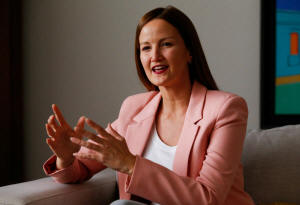Paraguay's women battle to break political glass ceiling
 Send a link to a friend
Send a link to a friend
 [April 29, 2023]
By Lucinda Elliott [April 29, 2023]
By Lucinda Elliott
ASUNCION (Reuters) - In Paraguay's election on Sunday, Soledad Nunez, a
40-year-old engineer and former minister, is looking to break into the
South American country's male-dominated political arena as its first
elected female vice president.
Paraguay - which has a reputation for misogynist 'machista' culture even
within the often conservative region - has been tough for women seeking
to enter politics. Only 15% of lawmakers are women, below the Latin
American regional average of around a third.
At the last election five years ago, only one of the candidates for
president or vice president was a woman. But there are signs of change,
with seven female candidates out of 26 this time around.
"Something is shifting, even if slowly," Nunez told Reuters in an
interview, recalling how when she was a student a university professor
had told her engineering class of eight women and over 90 men that
ladies should be cleaning the floors and cooking.
"From a young age... I saw very few women in leadership roles, across
politics and in industry," said Nunez, who at 31 became the youngest
ever female minister in 2014.

"Having a woman at the top will have consequences," she said. "Just
being there is important because it inspires confidence in others to
take part."
Nunez is the vice presidential candidate for the main opposition
coalition, hoping to unseat the ruling Colorado Party. Opinion polls
ahead of the vote have been mixed and the contest is expected to be
close.
If elected, Nunez and her presidential running-mate Efrain Alegre have
committed to gender parity in the cabinet. Around a quarter of current
ministers are women.
The more right-wing Colorado party has also approved gender parity plans
for the cabinet, though two men are on its ticket.
Lea Gimenez, a former Paraguayan finance minister from the Colorado
Party, told Reuters that there was a "tough, hard-fought" process for
women to get into local politics.
"Many times the women who start to venture into politics are newer than
the men and that implies a learning process," she said. "But I'd want to
make it for having done a good job and not for a quota."
Progress for Paraguayan women has been patchy.

[to top of second column]
|

Soledad Nunez, Paraguay's opposition
vice presidential candidate and running mate of the presidential
candidate Efrain Alegre, talks to Reuters ahead of the national
elections, in Asuncion, Paraguay April 18, 2023. REUTERS/Cesar
Olmedo

They were among the last in Latin America to be allowed to vote or
register as candidates in elections, in 1961. In 1992, when
democracy was restored after a 35-year dictatorship, gender equality
was enshrined in the constitution.
In the elections five years ago, not a single female governor was
elected among the 17 state governors. But in municipal elections in
2021, around a quarter of posts went to women.
In 2021, an electoral change was implemented that means voters must
rank their favored lawmakers, as opposed to a closed list choice -
the aim being to create a wider and more competitive field of
contenders.
Some women are worried that may work against female candidates, who
often contend with having less political apparatus and campaign
funding.
"Each candidate will have to campaign alone, creating huge costs for
individuals, which is detrimental to female nominees," said Senator
Esperanza Martinez, 63.
Martinez, from the left-wing Frente Guasu alliance, is among 45
senators up for re-election. Only eight Senate seats, around
one-fifth, are currently held by women, a number she expects to
decline after the election.
"There can be a long list of female candidates to choose from, but
they won't be voted in if they don't have visibility and travel
across the country," she said. "What little we represent in the
Senate will get worse under this system."
Rights activist and politician Lilian Soto agreed: "From now on,
you'll need more resources to get yourself known," she said.

Martinez said, however, that the cabinet gender parity policy was an
important step, which comes amid broader debates in universities and
businesses around women's rights, often being pushed by younger
generations.
"By insisting on gender parity, it opens up the debate further,"
Martinez said. "However, the bars to entry in politics are still too
onerous to ignore."
(Reporting by Lucinda Elliott; Editing by Adam Jourdan and Rosalba
O'Brien)
[© 2023 Thomson Reuters. All rights
reserved.]This material may not be published,
broadcast, rewritten or redistributed.
Thompson Reuters is solely responsible for this content. |